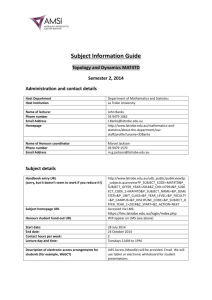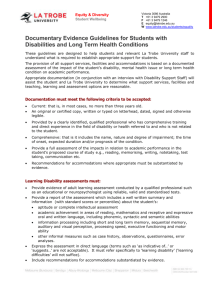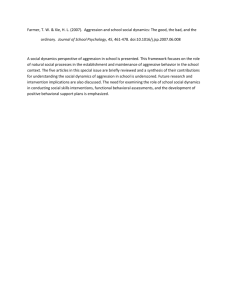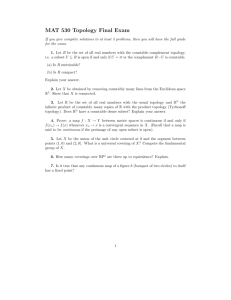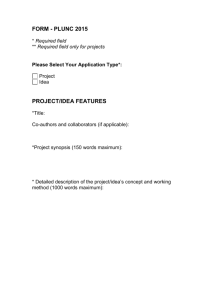Subject Information
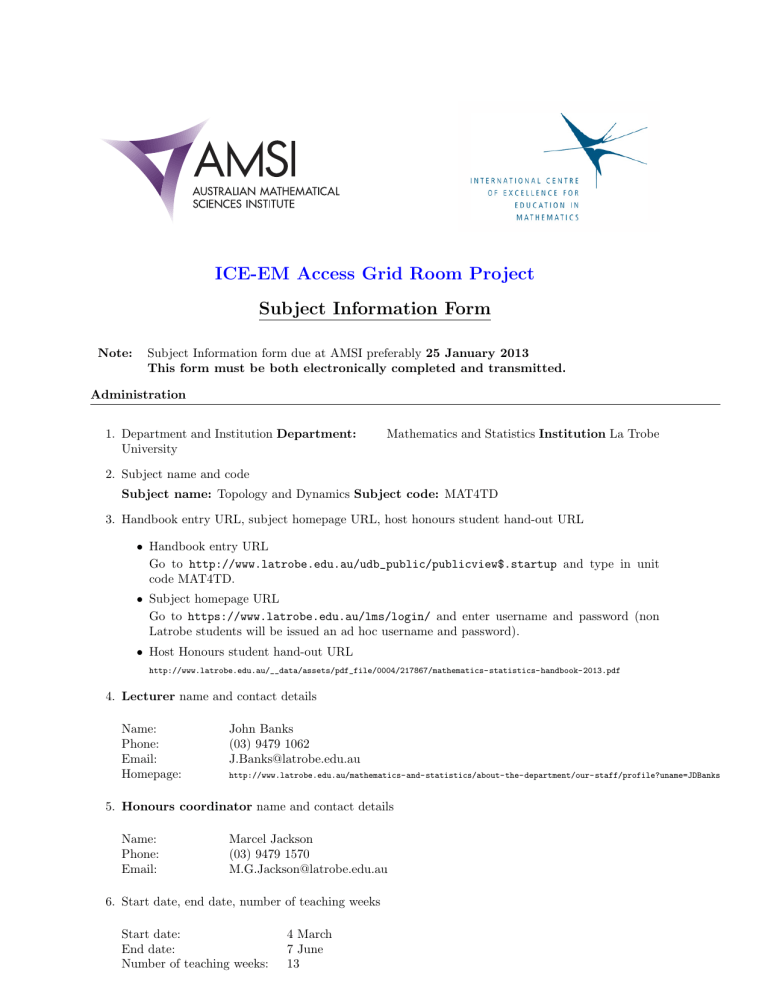
ICE-EM Access Grid Room Project
Subject Information Form
Note: Subject Information form due at AMSI preferably 25 January 2013
This form must be both electronically completed and transmitted.
Administration
1. Department and Institution Department:
University
Mathematics and Statistics
2. Subject name and code
Subject name: Topology and Dynamics Subject code: MAT4TD
Institution
3. Handbook entry URL, subject homepage URL, host honours student hand-out URL
La Trobe
• Handbook entry URL
Go to http://www.latrobe.edu.au/udb_public/publicview$.startup
and type in unit code MAT4TD.
• Subject homepage URL
Go to https://www.latrobe.edu.au/lms/login/ and enter username and password (non
Latrobe students will be issued an ad hoc username and password).
• Host Honours student hand-out URL http://www.latrobe.edu.au/__data/assets/pdf_file/0004/217867/mathematics-statistics-handbook-2013.pdf
4.
Lecturer name and contact details
Name:
Phone:
Email:
Homepage:
John Banks
(03) 9479 1062
J.Banks@latrobe.edu.au
http://www.latrobe.edu.au/mathematics-and-statistics/about-the-department/our-staff/profile?uname=JDBanks
5.
Honours coordinator name and contact details
Name:
Phone:
Email:
Marcel Jackson
(03) 9479 1570
M.G.Jackson@latrobe.edu.au
6. Start date, end date, number of teaching weeks
Start date:
End date:
4 March
7 June
Number of teaching weeks: 13
2
7. Contact hours per week
2 hours
8. Description of electronic access arrangements for students (for example, Black Board)
La Trobe LMS (Moodle)
Academic
1. Overview of subject content
We develop some definitions and results of very general application in point set topology and use them to explore the theory of (discrete time) topological dynamics . This will include an exploration of chaos and related dynamical properties. The point set topology is developed simultaneously with the topological dynamics and applications of the topology to the dynamics being added progressively as we proceed. There will be a strong focus on symbolic dynamics where we represent the state of a dynamical system as an infinite string of symbols drawn from a finite alphabet. In this context, we will see the connection between dynamical systems and the theory of formal languages which underpins much of theoretical computer science.
2. Detailed syllabus, preferably week by week (may vary slightly depending on mini-project topics chosen by students):
11
12
13
7
8
9
10
Week
1
2
5
6
3
4
Topology Topic(s) Dynamics Topic(s)
Bases, Countability properties, Sub-bases.
Intro to discrete time dynamical systems.
Closure, Interior, Boundary, Orbits, Periodic points.
Limits, Continuity, Homeomorphisms.
Separation Properties, Metric Spaces.
Compactness and related concepts.
Baire spaces.
Connectedness and related concepts.
Finite products, Topological groups.
Countable products
General products and Tychonoffs Theorem
Student presentations of mini-projects.
Student presentations of mini-projects.
Student presentations of mini-projects.
Invariant sets, Conjugacy.
Sensitive dependence.
Attractors and repellors, Bifurcations.
Transitivity and related concepts, Chaos.
Dynamics of one-dimensional maps.
Group rotations.
Symbolic dynamics and languages
Shifts of finite type and Sofic shifts.
Sofic shifts.
Spacing shifts and return times.
Inverse Limits.
3. Detailed breakdown of assumed prerequisite knowledge, including host prerequisite subject URLs
(a) It is assumed students have already encountered the theory of point set topology and metric spaces including general definitions of:
• Open, closed and dense sets and the closure of a set,
• Continuity and convergence,
• Hausdorff spaces,
• Connectedness and path connectedness,
• Compactness,
• Basis for a topological space,
• Finite product of topological spaces.
and the standard theorems relating these concepts to one another.
(b) Although some previous experience of these ideas is assumed, they will be revised as further definitions and results in point set topology are gradually introduced.
(c) No previous study of dynamics is assumed.
(d) Host prerequisite subject: MAT3TA, Topology and Analysis
(e) Host prerequisite subject URL: Go to http://www.latrobe.edu.au/udb_public/publicview$.startup
and type in unit code MAT3TA.
3
4. Assessment
• Exam/assignment/class work breakdown
Exam
Assignment
Class work
Mini-Project
NA
40 %
0 %
60 %
• Assignment due dates: April 12 (week 5) and May 17 (week 10).
• Mini-project due June 14.
• Approximate exam date: N/A
5. Required student resources
• Comprehensive subject text MAT4TD Topology and Dynamics will be provided on-line (and as hard copy if requested).
• There are no mandatory software requirements, but access to LATeX is desirable for miniproject.
• Some kind of electronic whiteboard or tablet will be needed for student presentations.
Institutional Honours Details
1. Weight of subject in total honours assessment at host department
12.5%
2. Thesis/subject split at host department
Thesis 37.5% / Subjects 62.5%.
3. Honours grade ranges at host department
H1 = 80-100 %
H2a = 70-79 %
H2b = 60-69 %
H3 = 50-59 %
?
W
F B
